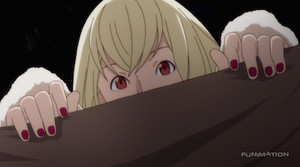Maria the Virgin Witch
Episode 5
by Gabriella Ekens,

You can tell that it's time for some serious politicking when Bernard busts out the apple cider.
The episode begins by catching us up on the priest's schemes. Turns out that he's related to the local lord and conspiring with him to further France's interests in the war. The current plan is to manipulate Maria's intervention in their favor and eliminate her once they've enacted peace. I'm still not sure to what extent Bernard is acting according to self-interest. If he is at all, it's on the national level rather than for the benefit of all mankind, but it's becoming increasingly clear that he's bending scripture to suit his own aims. If anything, he's following the letter of the law rather than the spirit, while Maria is more in tune with aspects of the spirit, but has an overly simplistic view of human nature. Bernard also employs deceit while Maria is transparent about her methods and goals. I'm excited to see how these two will eventually come into direct conflict.
The bulk of the episode was spent developing Galfa, Joseph's mercenary friend. He's living in a mercenary camp adjacent to some knights. One night, while inebriated, he spots a pretty lady and convinces her to sleep with him. The next morning, however, they're found in bed together by the woman's paramour – a knight of some stature – and a conflict breaks out between the two camps. The knight demands Galfa's head, but the Count is hesitant to do anything that might demoralize the mercenaries before a battle. Bernard proposes a compromise – a formal duel between the two, with the odds skewed heavily in the knight's favor. As the duel approaches, Joseph tries to convince his friend to run away, but Galfa rejects the idea, citing his pride as a mercenary. He goes through with the duel and wins by faking an injury until a crucial moment. Maria leaves without intervening while Bernard takes notice of Galfa for his future plans.
I like how much effort the show puts into depicting the minutia of daily life during the Hundred Year's War, particularly the mercenary camp. The show goes out of its way to emphasize that mercenaries are just people, who have formed their own society on the fringes of war. They support women, form families, and raise children. Galfa states that he “doesn't have a home,” indicating that he was probably born into the lifestyle. It's a surprisingly sympathetic look at a group of people who are usually depicted as disaffected antiheroes or villains-of-the-week in fiction. Of course, the series shows that side of them too – mercenaries are the ones pillaging villages and ravaging women – but they're not limited to that, and you can't condemn groups of people for their extremists. On these grounds, Maria cannot frame her intervention as an absolute good. They do their part to humanize the knights too. While Galfa's opponent, Jean, seemed like a pompous jerk, his reactions to what happened were understandable within a system that trains people to value a woman's chastity above everything. It's sad that he killed himself, and also sad that the woman involved vanished after the incident.
Joseph continues to be a really sweet guy. His determination to help out Galfa is admirable, even if they don't understand each other. Joseph can't relate to Galfa's stubborn pride, while Galfa is floored by Joseph's naiveté and generosity. They're both the products of their respective upbringings. Joseph's rearing in a specific place led to him valuing cooperative give-and-take exchanges based on emotional attachment. Meanwhile, Galfa's behavior is called “mercenary” for a reason. His approach to relationships seems mercantile, but not necessarily utilitarian. Unconditional kindness is not common in his world, so he's acutely aware of exchanges and dues in either money or favors. That's why he's so insistent on repaying Joseph – he doesn't take equality in a relationship for granted.
This was also what I will colloquially refer to as a “butt episode.” They're those episodes a little ways into the show where animation quality plummets, only to pick up again soon afterwards. One infamous example of this is Gurren Lagann episode four, but they're common – there's just something about this point in a show's run where everything comes crashing down a bit. While episode five doesn't earn itself a spot in the hilari-bad hall of fame alongside DRAMAtical Murder episode three, the models are noticeably less detailed and the animation is more jerky. The exception to this is Galfa's brawl, which really captures the weight of two men throwing their bulk around trying to overpower each other.
Maria's world has expanded, and now we need to see how it comes back around to her.
Grade: A-
Maria the Virgin Witch is currently streaming on Funimation.
Gabriella Ekens studies film and literature at a US university. Follow her on twitter.
discuss this in the forum (350 posts) |
back to Maria the Virgin Witch
Episode Review homepage / archives